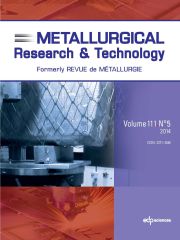No CrossRef data available.
Article contents
Recent advances in the modelling of solid flows in the blast furnace
Published online by Cambridge University Press: 06 April 2004
Abstract
The solid flow inside a blast furnace is modelled using a stand-alone finite element program and a constitutive equation called hypo-plastic, in order to better simulate the granular material behaviour. The parameters of this constitutive equation are calibrated using data obtained from simple soil mechanics tests on coke and sinter materials, such as triaxial and oedometric devices. Steady velocity, stress and void fraction fields are obtained after several iterations of the code. Knowledge of the solids velocity field makes it possible to determine the dead man profile, as well as its renewal kinetics. Burden trajectories and time lines are also computed. Knowledge of the stress field makes it possible to compute pressures acting on the burden as well as on the walls. Finally, the knowledge of the void fraction field makes it possible to determine gas paths. The solid flow model was validated on 2D and 3D small-scale cold blast furnaces, but the simulations never required any tuning parameter. This code is in fact an invaluable tool to determine the effect of blast furnace profile on solid flow conditions, and vice versa.
- Type
- Research Article
- Information
- Metallurgical Research & Technology , Volume 101 , Issue 3: Réduction directeCokerieAgglomérationHaut-fourneau , March 2004 , pp. 225 - 232
- Copyright
- © La Revue de Métallurgie, 2004


